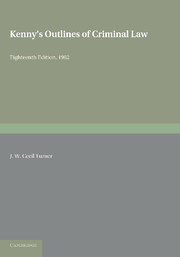Book contents
- Frontmatter
- Preface to the Sixteenth Edition
- Preface to The Seventeenth Edition
- Preface to the Eighteenth Edition
- Contents
- Index of cases
- Index to the principal statutes
- List of principal books cited
- BOOK I GENERAL CONSIDERATIONS
- BOOK II DEFINITIONS OF PARTICULAR CRIMES
- CHAPTER VII HOMICIDE
- CHAPTER VIII OFFENCES AGAINST THE PERSON THAT ARE NOT FATAL
- CHAPTER IX BIGAMY
- CHAPTER X CRIMINAL LIBEL
- CHAPTER XI OFFENCES AGAINST PROPERTY
- CHAPTER XII BURGLARY AND HOUSEBREAKING
- CHAPTER XIII STEALING
- CHAPTER XIV EMBEZZLEMENT
- CHAPTER XV FRAUDULENT CONVERSION
- CHAPTER XVI CHEATS PUNISHABLE AT COMMON LAW
- CHAPTER XVII FALSE PRETENCES
- CHAPTER XVIII RECEIVING STOLEN PROPERTY
- CHAPTER XIX OTHER OFFENCES INVOLVING FRAUD
- CHAPTER XX FORGERY
- CHAPTER XXI OFFENCES AGAINST THE STATE
- CHAPTER XXII CONSPIRACY AND INDUSTRIAL DISPUTES
- CHAPTER XXIII PERJURY AND OTHER OFFENCES AGAINST PUBLIC JUSTICE
- CHAPTER XXIV OFFENCES AGAINST INTERNATIONAL LAW
- CHAPTER XXV OFFENCES OF VAGRANCY
- BOOK III MODES OF JUDICIAL PROOF
- BOOK IV CRIMINAL PROCEDURE
- Appendix I The meaning of ‘credit’
- Appendix II II Rules as to admission of evidence which reveals to the jury facts discreditable to the person accused
- Appendix III III Forms of indictment
- Index
CHAPTER XXIII - PERJURY AND OTHER OFFENCES AGAINST PUBLIC JUSTICE
from BOOK II - DEFINITIONS OF PARTICULAR CRIMES
Published online by Cambridge University Press: 05 June 2016
- Frontmatter
- Preface to the Sixteenth Edition
- Preface to The Seventeenth Edition
- Preface to the Eighteenth Edition
- Contents
- Index of cases
- Index to the principal statutes
- List of principal books cited
- BOOK I GENERAL CONSIDERATIONS
- BOOK II DEFINITIONS OF PARTICULAR CRIMES
- CHAPTER VII HOMICIDE
- CHAPTER VIII OFFENCES AGAINST THE PERSON THAT ARE NOT FATAL
- CHAPTER IX BIGAMY
- CHAPTER X CRIMINAL LIBEL
- CHAPTER XI OFFENCES AGAINST PROPERTY
- CHAPTER XII BURGLARY AND HOUSEBREAKING
- CHAPTER XIII STEALING
- CHAPTER XIV EMBEZZLEMENT
- CHAPTER XV FRAUDULENT CONVERSION
- CHAPTER XVI CHEATS PUNISHABLE AT COMMON LAW
- CHAPTER XVII FALSE PRETENCES
- CHAPTER XVIII RECEIVING STOLEN PROPERTY
- CHAPTER XIX OTHER OFFENCES INVOLVING FRAUD
- CHAPTER XX FORGERY
- CHAPTER XXI OFFENCES AGAINST THE STATE
- CHAPTER XXII CONSPIRACY AND INDUSTRIAL DISPUTES
- CHAPTER XXIII PERJURY AND OTHER OFFENCES AGAINST PUBLIC JUSTICE
- CHAPTER XXIV OFFENCES AGAINST INTERNATIONAL LAW
- CHAPTER XXV OFFENCES OF VAGRANCY
- BOOK III MODES OF JUDICIAL PROOF
- BOOK IV CRIMINAL PROCEDURE
- Appendix I The meaning of ‘credit’
- Appendix II II Rules as to admission of evidence which reveals to the jury facts discreditable to the person accused
- Appendix III III Forms of indictment
- Index
Summary
Section I. Perjury
HISTORY
Early limitations. In Anglo-Saxon legal procedure, judicial oaths played a very important part, being taken both by jurors and by compurgators. Both these classes were punishable for any perjuries they uttered. But the functions of the modern witness had not yet been differentiated from those of the juror; and perjury by witnesses was consequently an unknown crime. And when, in the fourteenth century, witnesses began to be brought in to inform the jury, perjury by them was not made a punishable offence. Hence it became a maxim that the law regarded every witness's oath as true. Even the ecclesiastical courts, though treating breaches of faith in general as matters within their jurisdiction, took no notice of the grave breach of faith involved in giving false witness. But, before the end of the fifteenth century, the Star Chamber sometimes interposed to punish perjuries. And, in the sixteenth century, Parliament itself began to interfere with the immunity of witnesses, dealing in 1540 with subornation of perjury, and in 1562 with perjury itself. But for each of these offences it imposed only a pecuniary penalty, recoverable civilly by a penal action. Finally, however, the Star Chamber, in 1613, declared perjury by a witness to be punishable at common law.
Subsequent extension. The offence thus created was one which could only be committed in a judicial proceeding and by a witness who gave false evidence on oath. But the law gradually came to assume a far more complicated form. Parliament specified various matters which were not judicial proceedings, yet in which the telling a falsehood upon oath was to be a perjury. Again, some classes of witnesses came to be allowed by statute to give evidence in judicial proceedings on mere affirmation, without any oath; and falsehood by them, though no perjury, was made as severely punishable as if it were one.
- Type
- Chapter
- Information
- Kenny's Outlines of Criminal Law , pp. 421 - 428Publisher: Cambridge University PressPrint publication year: 2013



